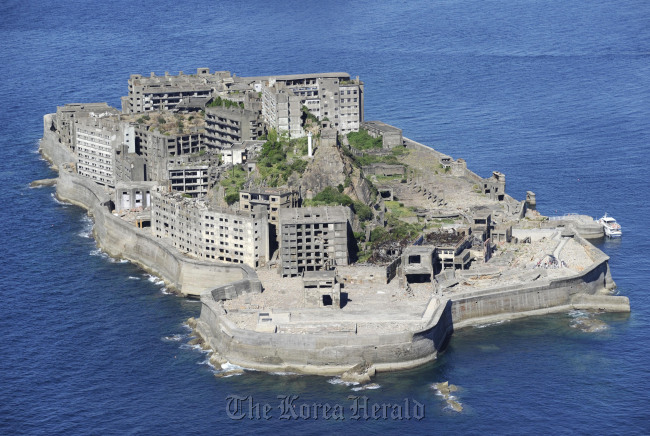Japan’s major wartime industrial facilities were listed as World Heritage sites on Sunday, with Tokyo conceding forced labor and other cruelties against Koreans for the first time on the world stage and vowing measures to commemorate the victims.
The decision made at a World Heritage Committee conference in Bonn, Germany, marked a breakthrough between South Korea and Japan following grueling two-month negotiations over how to address the appalling chapter of the archipelago country’s history that eclipsed its stellar postwar industrial transformation.
After Tokyo initiated the campaign in January 2014, Seoul staged a strong protest, claiming that in seven of the proposed 23 sites, hundreds of thousands of Koreans were forced into slave labor under Japanese colonial rule.
In a footnote enshrined on the final document, Japan said it was prepared to take measures to promote understanding that there were “a large number of Koreans and others who were brought against their will and forced to work under harsh conditions in the 1940s at some of the sites.”
It also pledged to “incorporate appropriate measures into the interpretive strategy to remember the victims” such as setting up an information center.
The statement was “taken note of” by the committee as it will promote the understanding of the “full history of each site.” Tokyo is mandated to formulate a follow-up mechanism and report progress to the World Heritage Center by the end of 2017, which is expected to be reviewed by the committee at its meeting the following year.

Seoul welcomed the outcome, saying it “sufficiently reflects our rightful concerns.”
“Japan’s statement has significance in that it virtually represents its first formal mentioning before the international community that Koreans provided labor against their will during Japanese colonial rule,” Foreign Minister Yun Byung-se said after the decision.
“I believe we have achieved two feats this time: We had managed to carry through our principle and position that historical facts ought to be reflected as they are, while avoiding an extreme confrontation with Japan and resolving the problem through dialogue, which could contribute to a stable development of the bilateral relationship.”
In May, Japan secured the endorsement of the International Council on Monuments and Sites, a UNESCO advisory panel better known as ICOMOS, for the registration of 23 sites of Japan’s Meiji Industrial Revolution, built in the late 19th to early 20th centuries.
They represent the “first successful transfer of industrialization from the West to a non-Western nation,” based on iron and steel, shipbuilding and coal mining particularly to meet defense needs, the panel wrote in its recommendation.
Yet it also requested an “interpretive strategy” for the nominated properties to enable an understanding of the full history of each one.
Among them are the Hashima undersea coal mine off Nagasaki, known as “Battleship Island.” The workers, mostly conscripted from Korea and China, had to work more than 12 hours a day, isolated from the outside world and facing frequent tunnel collapses, gas explosions, falling rocks and other harsh work conditions.
Koreans were also mobilized to build warships, torpedoes and other military supplies in the Nagasaki shipyard run by Mitsubishi Heavy Industries. Many of them died, either in the U.S.’ atomic bombing in 1945 or while carrying out reconstruction work afterward.
Tokyo, which refused to budge during initial negotiations, has apparently decided to opt for a compromise in the face of mounting pressure not only from Seoul but also council chair Berlin and other member states and souring international sentiment.
“Japan’s statement is virtually unprecedented at an intergovernmental organization,” a senior Foreign Ministry official told reporters on customary condition of anonymity. “As a result of our omnidirectional diplomatic efforts, the international community including the council member countries now have a better understanding of the issue.”
By Shin Hyon-hee (heeshin@heraldcorp.com)


![[Weekender] Geeks have never been so chic in Korea](http://res.heraldm.com/phpwas/restmb_idxmake.php?idx=644&simg=/content/image/2024/05/16/20240516050845_0.jpg&u=)


![[News Focus] Mystery deepens after hundreds of cat deaths in S. Korea](http://res.heraldm.com/phpwas/restmb_idxmake.php?idx=644&simg=/content/image/2024/05/17/20240517050800_0.jpg&u=)

![[Herald Interview] Byun Yo-han's 'unlikable' character is result of calculated acting](http://res.heraldm.com/phpwas/restmb_idxmake.php?idx=644&simg=/content/image/2024/05/16/20240516050855_0.jpg&u=)

![[Photo News] Seoul seeks 'best sleeper'](http://res.heraldm.com/phpwas/restmb_idxmake.php?idx=644&simg=/content/image/2024/05/18/20240518050098_0.jpg&u=)








